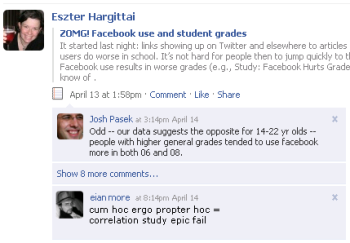 Following up on my blog post from a few weeks ago, a couple of colleagues and I have published a formal response to the media frenzy covering the study that claimed a relationship between Facebook use and lower grades.
Following up on my blog post from a few weeks ago, a couple of colleagues and I have published a formal response to the media frenzy covering the study that claimed a relationship between Facebook use and lower grades.
Back when the story broke about Aryn Karpinski’s research, most media outlets ran with the claims made in the original press release or even took it to a next step by suggesting a causal relationship between Facebook use and lower grades. Only a few outlets took care in reporting, among them the Chronicle of Higher Education. In the last few days, the BBC has had a piece considering the various perspectives.
By the way, this is the quickest turn-around I’ve ever experienced with an academic publication. Below the fold is a bit more describing how it came about. [click to continue…]